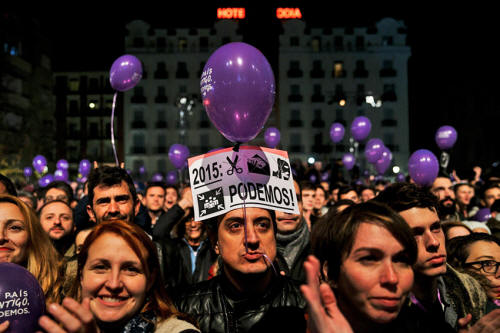|
from
WorldPoliticsReview Website
hold Greek national flags as they sing the national anthem outside the Greek police headquarters in Athens September 28, 2013. Lawmakers and members of the far-right Golden Dawn party arrested on Saturday on charges of being part of a criminal organization will get a fair trial, Greek Justice Minister Haralambos Athanassiou said.
REUTERS/John
Kolesidis
react after the election results at the party's main electoral center, Athens, Sept. 20, 2015
(AP photo by Lefteris
Pitarakis).
And as the latest round of brinkmanship
over the next bailout tranche for Greece shows, the crisis is far
from resolved. It's still too early to tell what kind of EU will
eventually emerge from the crisis, but it is not too early to take
stock of the political changes the past five years have already
brought about. Conventional wisdom has it that both left- and right-wing populism have been on the rise across the continent. Yet this lazy equation of left and right fails to capture a more complex picture:
Their major achievement has been to establish an alternative to social-democratic parties that to some degree have been discredited by their association with the so-called Third Way of Tony Blair and Gerhard Schroeder, which sought to reconcile the European left with market-friendly reforms and globalization.
Meanwhile, right-wing populism does
indeed threaten national democracies, both opposing and in a curious
way benefiting from technocratic EU policies advancing austerity.
We are likely to see more indecisive elections, such as in Spain in December 2015, and, to some extent, Ireland in February 2016, and also ever-grander coalitions of parties uniting against right-wing populists, as witnessed in the aftermath of elections in several German federal states in March, as well as in the Austrian presidential elections in May.
Whether this development amounts to a "crisis of representation," as is often claimed, will depend on the answers to two questions:
The British social scientist Colin Crouch coined the term "post-democracy" more than a decade ago; his German counterpart Wolfgang Streeck more recently began to speak of "façade democracies."
The notion of post-democracy, especially, has widely resonated across the continent, capturing a diffuse sense that while the machinery of democracy - elections and transfers of power, among other things - continues to function, the heart and soul of democracy appear to have died.
Both Crouch and Streeck have blamed the power of financial elites and the straitjacket that the European Union, and the Eurozone in particular, have put on policymaking.
But both have also relied on the image
of a golden age of popular sovereignty in Europe, with which the
sordid present can then be contrasted.
Elsewhere, the situation was rather different:
To do so, they relied on a particular image of the past:
The notion of post-democracyhas widely resonated across the continent,capturing a diffuse sense that whilethe machinery of democracy continues to function,the heart and soul of democracyappear to have died.
As a consequence, political development in postwar Europe was bent toward fragmenting political power, for instance by creating checks and balances as well as by empowering unelected institutions such as constitutional courts to protect individual rights.
This new order was based on specific lessons that European elites rightly or wrongly drew from the political catastrophes of midcentury. Its architects looked at the ideal of popular sovereignty with a great deal of distrust.
After all, how could one trust peoples
who had brought fascists to power or extensively collaborated with
fascist occupiers?
After all, hadn't legitimate representative assemblies handed power over to Adolf Hitler in Germany and to Marshal Philippe Petain, the leader of Vichy France, in 1933 and 1940 respectively?
Hence distrust of unrestrained popular sovereignty, or even unconstrained parliamentary sovereignty, became part of the DNA of postwar European politics.
This approach was also almost always adopted by the countries that were able to shake off dictatorships and turn to liberal democracy in the last third of the 20th century:
European integration was part and parcel of this comprehensive attempt to constrain the popular will; it added supranational constraints to national ones.
This logic was more evident initially with institutions like the Council of Europe and the European Convention on Human Rights, which is at the heart of what observers agree to be the world's most successful regional regime for human rights protection.
But the desire to "lock in" liberal-democratic commitments became more pronounced in a specific EU context - at the time, the European Economic Community - with the transitions to democracy in Southern Europe in the 1970s, and, again, in Central and Eastern Europe after 1989.
In all these cases, political actors followed the wisdom of Ulysses when faced with the Sirens:
But less obviously, they also always
insisted that increased protections of individual rights against the
prerogatives of popularly elected individuals and institutions were
not undemocratic; and in the case of rights directly connected to
democracy itself, such as free speech and free assembly, they could
even be a means of strengthening democracy as such.
But from the beginning, this explicitly
anti-totalitarian and implicitly anti-populist political order,
built on a distrust of popular sovereignty, was always particularly
vulnerable to political actors asserting the "popular will" against
too many constraints created by elites.
"Populism" is regularly employed as a synonym for "anti-establishment," irrespective, it seems, of any particular political ideas. By this approach, attitude counts for everything, while content and whether a party is on the right or the left simply do not seem to matter.
As a result, France's National Front on the right and Greece's Syriza on the left are both labeled as populist.
Even more disorienting is the fact that European parties that only oppose particular EU policies - for instance, measures to save the Euro - and others that wish to leave or abolish the union entirely are both likewise designated as populist "anti-Europeans."
And as if all this were not enough cause for confusion, populism is sometimes just equated with irresponsible policy proposals in such a way that it becomes the same thing as demagoguery.
European integrationwas part and parcelof a comprehensive attemptto constrain the popular will.
Now, one can accept that some policies really are irrational, while still insisting that this is not a useful criterion for determining what constitutes populism.
In most areas of public life, there simply is no absolutely clear line between responsibility and irresponsibility, and often enough, charges of irresponsibility are themselves deeply partisan or based on highly contestable value judgments.
As a result, setting up a distinction
between populism and responsible policies only
obscures the real issues at stake. It can also be an
all-too-convenient way to discredit criticism of certain policies.
One necessary condition is to be
critical of elites, although this alone is not sufficient. If it
were, anyone criticizing the status quo in Greece or Italy, for
instance, would by definition be a populist. And whatever else one
thinks about Syriza or the 5-Star Star Movement - the insurgent
political party started by Italian blogger and comedian Beppe
Grillo - it is hard to deny that their attacks on elites often
seem warranted.
Think, for instance, of Turkish President Recep Tayyip Erdogan declaring at a party congress in defiance of his numerous domestic critics,
Of course, he knew that his opponents were Turks, too.
The claim to exclusive representation is not an empirical one; it is always distinctly moral. When running for office, populists portray their political competitors as part of the immoral, corrupt elite. When ruling, they refuse to recognize any opposition as legitimate.
The populist logic also implies that whoever does not support populist parties must not truly be part of the people.
Put simply, populists claim to represent not a portion of the entire population, but the entire authentic people:
That is another way of saying that populism is an exclusionary form of identity politics, and by consequence always tends to pose a danger to democracy.
For democracy requires pluralism and the recognition that free, equal, but also irreducibly diverse citizens must find fair terms of living together.
As the philosopher Jürgen Habermas once put it,
The idea of the single, homogeneous,
authentic people is a fantasy, and a dangerous one, because
populists do not just thrive on conflict and encourage polarization;
they tend to treat their political opponents as "enemies of the
people."
To say that the Euro crisis is to blame is, on one level, obviously correct, but is not really an explanation. After all, democracies can be said to be perpetually creating crises and, at the same time, to have the resources and mechanisms for self-correction.
Not every crisis leads to an upsurge of
populism, whereby a part of the people makes the moral claim to
represent the whole and dismisses everyone else.
What is new is that technocracy is seen as a kind of regime in its own right, one that has become dominant in the EU.
Not by chance did Habermas, Europe's most influential intellectual, title his latest book "The Lure of Technocracy."
(The original German title, "Im Sog der Technokratie" is even stronger, implying that Europeans are "being sucked into technocracy," as if at the mercy of quasi-natural forces.)
Put simply,populists claim to representnot a portion of the entire population,but the entire authentic people:Not just the 99 percent,but 100 percent.
The fact that both populism and technocracy have become so prominent in European public discourse is a sign of deep political anxieties.
They each have something to do with democracy.
Put schematically:
In the first camp's nightmare scenario,
masses mobilized in favor of irresponsible policies trample on
minority rights; in the second case, anything resembling politics is
replaced with the supposedly rational administration of the state
and economy by elites.
To begin with, both insist that there is only one correct policy solution, even when experts in fact disagree.
In both cases, there is no need for debate, discussions in civil society, or lengthy back-and-forth in parliaments.
Disagreeing with populists is just a
sign that one is part of the morally corrupt elites; disagreeing
with technocrats demonstrates that one is irrational.
Populism, in contrast, has become business-like: Think of former Italian Prime Minister Silvio Berlusconi and, in the Czech Republic, the promise of Andrej Babis, the highly successful entrepreneur and current finance minister, to run the country like one of his companies.
In Austria, businessman Frank
Stronach
made a splash in the last national elections
by equating good government with a competent "management team."
The more Brussels elites and national governments assert that "there is no alternative" to certain austerity policies, the more traction the populist appeal that,
And the more populists appear to be able
to mobilize people against supranational agreements, even those
authorized by democratically elected governments, the more
technocrats are likely to think that certain decisions should not be
opened to public debate at all.
It is well known that Marine Le Pen, the leader of France's National Front, has attempted a "dediabolization" - or de-demonization - of the party, moving it away from the racist and anti-Semitic rhetoric of her father, party founder Jean-Marie Le Pen.
What is less well understood is that Le Pen presents herself as the last real defender of France's republic against a German-dominated European Union bent on destroying French republican values, in particular the ideal of undivided popular sovereignty.
In the same vein, Hungarian Prime Minister Viktor Orban has castigated postwar European elites for being afraid of the people - an assessment that is historically not completely false - and presents himself as the real champion of democratic and national values.
The fact that bothpopulism and technocracyhave become so prominentin European public discourseis a sign of deep political anxieties.
As a reaction, other parties have increasingly united against right-wing populists, setting aside their programmatic differences in the process.
The template has been, for example, the rallying of all of France's political parties against Jean-Marie Le Pen after he reached the second round of the French presidential election in 2002, and the "cordon sanitaire" - or quarantine - created by Belgian Flemish parties around the racist Vlaams Belang party.
Such strategies come at a price, though:
They consider the decision by social-democratic parties in the 1990s to effectively join a neoliberal consensus in the hope that they could create a kind of neoliberalism with a social conscience - or, to coin a phrase, neoliberalism with a human face - to have been a fatal mistake.
Instead, those parties were often at the forefront of deregulating the financial sector and cutting back the rights of labor.
According to Chantal Mouffe, an influential Belgian theorist of "radical democracy," the convergence of parties adopting the Third Way led to a situation where voters had a choice about as meaningful as that between Coke and Pepsi.
Right-wing populists could then pick up
the concerns of the working class and mobilize blue-collar workers
against their historical representatives, such as the Socialists in
France and the Social Democrats in Austria.
Many of the attempts to do so have been inspired by the Argentine thinker Ernesto Laclau, who was close to the Kirchners and who has been adopted as a theoretical lodestar by Podemos in Spain and to a lesser degree Syriza in Greece.
Laclau argued that,
He held that fundamental change only comes about when different social actors - usually the "underdogs," in his words - completely oppose an existing regime as illegitimate and construct a new collective out of heterogeneous groups.
In other words, left-wing populism is
not defined by a particular set of ideas such as
Hugo Chavez's Bolivarian
"socialism for the 21st century"; rather, at its heart is the
populist claim that a party or leader can represent the people as a
whole.
It has meant that Beppe Grillo in Italy has claimed that his 5-Star Movement deserves nothing less than 100 percent of the seats in parliament, implying that all other contenders are illegitimate.
On a more theoretical plane, it has led Streeck to portray today's main political conflict as one between the people - what he calls the "governanced" - on one hand, and the "market people" of investors, or the de facto governors, on the other.
The hope seems to be that by drawing on
the populist imagination, one can mobilize citizens and direct their
passions to progressive projects. 5-Star Movement leader Beppe Grillo with a poster in Italian reading "Out of the Euro, 50,000 signatures already collected in a weekend," Rome, Dec. 18, 2014 (AP Photo by Domenico Stinellis).
Syriza and Podemos have
been successful because corruption and incompetence discredited
established parties, not because they claimed that they represented
the people as a whole.
The latter still advocates far-reaching constitutional changes for Spain, but is also coming to terms with the fact that it might not replace the socialists as the main left-wing party in an increasingly fragmented party system.
The latest polls indicate that Spaniards
will split their vote among 10 parties in the June 26 election; many
observers
predict yet another hung parliament.
More astonishing still is the precise origin of some of these parties:
The conventional wisdom used to be that emerging political parties eventually needed to find ways to deal with the media.
Now, the medium seems to come first,
followed by the party. Supporters of the Podemos party, Madrid, Dec. 20, 2015 (AP photo by Daniel Ochoa de Olza).
Podemos is unthinkable without the Indignados, the Spanish version of the Occupy movement, and campaigns such as the "Platform for People Affected by Mortgages," which tried to help people keep their homes after the Spanish real estate bubble burst.
And both Podemos and the 5-Star movement have relied on strong, charismatic leaders - the former's political science professor and party Secretary-General Pablo Iglesias, and the latter's often outright authoritarian Grillo.
Some anarchist ideas, such as horizontal
organizing, survive in the groups associated with Podemos in
Spain, but, overall, more traditional notions of party politics have
triumphed.
But it is far from clear that more fragmented European party systems signal such a crisis. In fact, the opposite might be true.
As the Dutch political scientist Cas Mudde has argued, European politics has become more complicated, with an increase of what social scientists call "cleavages."
These were historically based on conflicts such as rural versus urban, or labor versus capital. One new major cleavage is clearly between openness to the world and closure within the borders of one's own nation-state.
This new conflict can have a primarily
economic character, as is true of debates about free trade and
immigration, or a cultural one.
On the contrary, when conservative Germans who felt that Chancellor Angela Merkel had moved her Christian Democratic party too much toward the center created the Alternative for Germany, it actually signaled a gain in representation.
Moreover, the crucial variable is not the number of parties, as more parties do not necessarily mean instability, even if coalition-building might take much longer than used to be the case.
What matters is the degree of
polarization, and whether some parties go so far - as right-wing
populists generally do - as to not accept the legitimacy of their
competitors and to question the political system as a whole.
The Irish political scientist Peter Mair has argued that parties increasingly face a choice between being responsive and being responsible, debatable as the latter term is:
Syriza's fate is an illustration of a party shifting from responsiveness to some form of responsibility.
Yet the dilemma is not as stark as
it might appear at first sight. After all, leaving the Eurozone is
not a majority position in any country using the common currency.
So far, exercises in "more European democracy" have remained largely at the level of public relations.
Unless that changes, "post-democracy"
and "crisis of representation" retain at least some plausibility as
diagnoses of contemporary Europe.
|





